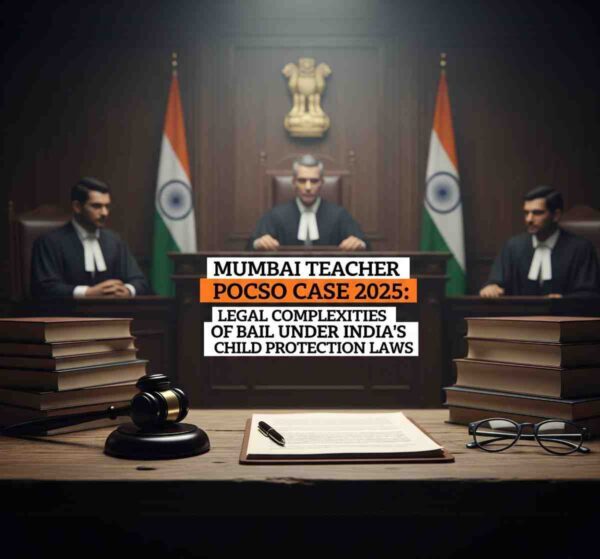Explore the 2025 Mumbai Teacher POCSO case, examining how courts handle bail in child sexual assault cases under the POCSO Act—a detailed breakdown of legal principles, challenges, and recent judgments.
Introduction
India’s legal framework has progressively developed to safeguard children from sexual offences, particularly with the introduction of the Protection of Children from Sexual Offences (POCSO) Act in 2012. This law was designed to offer a strong, child-centric legal framework for tackling cases of abuse, assault, and exploitation. However, recent court cases show the difficult balance judges must strike—between ensuring justice for victims and protecting the legal rights of the accused.
In 2025, a Mumbai teacher’s bail in a high-profile sexual offence case once again highlighted the challenges courts face, raising serious legal and ethical questions.
What Was the Mumbai Teacher POCSO Case?
In 2025, a Mumbai court dealt with a high-profile case in which a 40-year-old English teacher from a prominent school was accused of sexually abusing a 16-year-old . According to reports, the teacher had allegedly started grooming the student in December 2023, gradually leading to incidents of abuse. Some of the reported events took place in secluded areas and five-star hotels, suggesting a deliberate attempt to manipulate and exploit the minor over time.
Following his arrest, the accused was placed in police custody, which later transitioned into judicial custody. The court extended the remand period until July 16, 2025, but denied further police custody due to a lack of substantial justification from the investigating officer. The court’s later decision to grant bail became controversial, given the serious nature of the allegations.
Understanding the POCSO Act, 2012
The POCSO Act was introduced to establish a thorough legal structure aimed at safeguarding children—defined as individuals below 18 years of age—from sexual offences. It is a gender-neutral law, ensuring protection for both boys and girls.
Key Provisions of the Act:
Definition of a Child (Section 2(d))
- Any person below the age of 18 is legally considered a child, regardless of mental maturity or consent.
Categories of Sexual Offences:
- Penetrative Sexual Assault (Sections 3 & 4):
Involves any form of penetration—punishment from 7 years to life imprisonment. - Aggravated Penetrative Sexual Assault (Sections 5 & 6):
Applies when the offence is committed by individuals in a position of trust—such as teachers, police officers, or hospital staff—or involves additional harm or threats. Punishment is 10 years to life imprisonment. - Sexual Assault (Sections 7 & 8):
Involves non-penetrative touching with sexual intent, punishable by 3 to 5 years imprisonment. - Sexual Harassment (Sections 11 & 12):
Covers non-contact offences such as sexual remarks, stalking, or gestures, with punishment up to 3 years.
Presumption of Guilt (Section 29):
- If the prosecution proves basic facts, the burden of proof shifts to the accused. This is a unique deviation from general criminal law, where the accused is presumed innocent until proven guilty.
Procedural Framework (Section 31):
- Unless the POCSO Act states differently, Special Courts adhere to the Criminal Procedure Code (CrPC).
- These courts are required to adopt child-sensitive procedures, maintain confidentiality, and ensure a speedy trial.
Bail Challenges Under POCSO
Granting bail under POCSO is particularly challenging due to the seriousness of the charges, the strict burden of proof on the accused, and the need to safeguard the victim.
In the Mumbai teacher case, the court had to weigh multiple factors:
- The accused’s role as a teacher in a position of trust
- The alleged victim’s age (16 years)
- The pattern of grooming over months
- The location and manner of the reported incidents
- The stage of the investigation
Despite these serious elements, the court granted bail, citing a lack of sufficient grounds to keep the accused in continued custody, which sparked debate about whether such decisions undermine the protective nature of the law.
What Courts Have Observed Over the Years
Indian courts have issued various guidelines to help navigate complex POCSO cases, especially those involving young accused and consensual relationships.
Delhi High Court (Dharmander Singh Case, 2020):
This ruling outlined that the following factors should be considered:
- Age of both the victim and the accused
- The age difference between the two
- Nature of their relationship
- Whether any coercion or pressure was involved
- How the accused behaved after the incident
These are not fixed rules, but guiding principles for judicial discretion.
The Supreme Court’s 2024 Judgment in Deshraj @ Musa vs. State of Rajasthan
In this case, an 18-year-old boy was accused of being in a consensual relationship with a 16-year-old girl. The court granted bail after:
- Observing a small age gap
- Noting the accused had already spent five months in jail
- Acknowledging the slow progress of the trial
This judgment reflected a nuanced understanding of teenage relationships within the legal structure of POCSO.
Why the Mumbai Case is Different
While previous judgments have given relief in cases of teenage love, the Mumbai case is different in key aspects:
- There’s a significant age gap (24 years).
- The accused held a position of power and authority as a teacher.
- The relationship allegedly involved manipulative grooming over several months.
- The incidents reportedly occurred in private and hotel settings, not public or peer settings.
These factors, if proven true, place the case under aggravated sexual assault, a more severe category under POCSO.
Conclusion
The POCSO Act, 2012, remains one of the most powerful legal instruments to protect children from sexual abuse in India. However, cases like the Mumbai Teacher Case (2025) reveal the complexity of applying the law—especially when questions of consent, grooming, and authority figures are involved.
Courts must walk a fine line between upholding the strict standards of child protection and ensuring that the accused’s constitutional rights are not overlooked. As the legal system continues to evolve, it’s crucial to promote judicial sensitivity, balanced discretion, and child-centric justice in such sensitive cases.

























